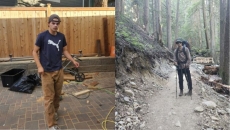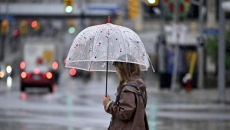Eight-three per cent of adults in this country have a regular primary-care provider, but that still leaves 5.4 million adults without one, a new report by the Canadian Institute for Health Information says.
Seniors 65 years and older are more likely to have access to a family doctor or nurse practitioner than younger adults between 18 and 34, and access to primary care is highest in Ontario and lowest in Nunavut, the CIHI report released Thursday says.
The report measures the baseline of health priorities agreed upon by the federal government and the provinces and territories, including improving access to primary care, reducing wait times for mental-health and substance-use counselling, recruiting more health-care workers, decreasing surgical wait times and increasing the use of electronic health information.
Data from Quebec was not available for this report but will be available in future, according to CIHI.
The institute will also collect data to measure progress on two more health priorities in the near future, including ensuring seniors can age with dignity and improving cultural safety for Indigenous patients in the health-care system.
There will be a report every year to measure progress in these health-care priorities across the country, federal health minister Mark Holland said in an interview on Wednesday.
Thursday's report says the surgical backlogs that happened during the COVID-19 pandemic have decreased and the number of surgeries performed has mostly returned to pre-pandemic levels across Canada.
Holland said each of the health-care funding agreements signed with the provinces and territories includes targets for the number of doctors and nurses that need to be added to the workforce.
Many rural and Indigenous communities are particularly hard-hit by the primary care shortage, the minister said.
In addition to recruiting doctors, nurse practitioners and nurses from other jurisdictions, the solution requires a "sustained effort" to encourage more First Nations, Métis and Inuit people — as well as others living in small towns and rural areas — "to be choosing health careers and really seeing far more people serving their own communities," Holland said.
The CIHI report noted that even if they have a primary-care provider, a recent survey showed Canadians still "face greater difficulty getting same-day, next-day, evening or weekend appointments" compared with people in nine other high-income countries including the U.S. and the U.K.
Jenna Kedy, a 20-year-old patient advocate who worked with CIHI on the report, said she's grateful to have a family doctor after being without one for almost two years, but getting immediate appointments is a challenge.
Kedy, who lives in Halifax, requires specialist care for several chronic conditions, including juvenile arthritis, fibromyalgia, anxiety and depression.
Having a family doctor is vital to "connect the dots for you" and keep track of her multiple health issues and medications, she said, but her doctor is too overworked to be available as much as she needs, she said in an interview with The Canadian Press.
"If I ever had a big thing come up, it's not like I could call my family doctor and go see him that week," Kedy said.
"As someone with such unpredictable illnesses, it still does cause unnecessary trips into the ER," she said.
"The doctors are overwhelmed and they can't provide the same level of care they could have if they had less on their plate.”
According to the CIHI report, there were 48,199 family physicians in Canada in 2022. In P.E.I, New Brunswick, Ontario, Saskatchewan, Alberta, B.C. and Yukon, more family doctors were entering the workforce than leaving it.
In Newfoundland and Labrador, Nova Scotia, and Manitoba, more were leaving the workforce than entering it. Data was not available for Quebec, N.W.T. or Nunavut.
But almost all provinces and territories saw more nurse practitioners entering the workforce in 2022 than leaving it.
The exceptions were Yukon, where more nurse practitioners were leaving than entering the workforce. Quebec data was not available.
Cheryl Chui, director of health system analytics at CIHI, said one of the other health-care priorities — using connected electronic health information systems — is an important part of solving the primary care shortage.
That's because it will "enable better sharing of information and to reduce some of the administrative burden that health-care professionals face,” she said.






